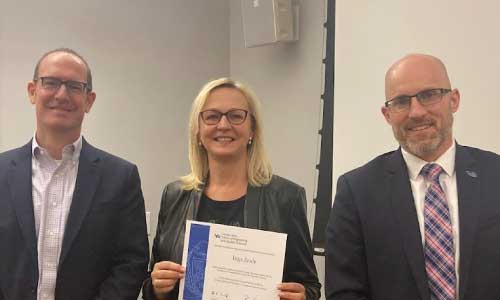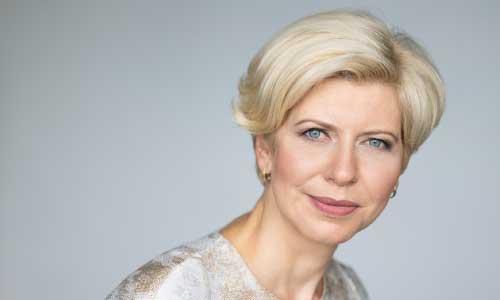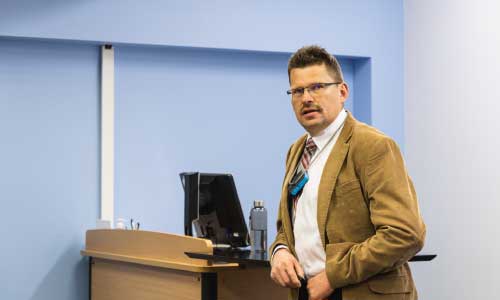Latvian university faculty members continue to master digital skills at the University at Buffalo
Eight more university faculty members from Latvia – professors and academic staff –are taking their final exams at the State University of New York at Buffalo, USA. They will return to Latvia before the end of the year. At the same time, beginning in January of 2023, as part of the Riga Business School administered European Regional Development Fund (ERAF) project,* another eight university faculty members will engage in full time studies at the University at Buffalo on how to raise the teaching quality of information and communications technologies. These studies are meant to ensure knowledge transfer in Latvian universities. This team of eight university faculty members, who will go to the USA beginning next year and will be the fifth group of university faculty members, will be the last in the program that has lasted for more than three years.
Eight university faculty members from the University of Latvia, Riga Stradins University, Liepaja University, EKA University of Applied Sciences, and BA School of Business and Finance will take part in the fourth training program round. In total, 66 university faculty members from more than 10 Latvian universities have participated in the project since 2019.
In January 2023, eight more participants will travel to the University at Buffalo, representing higher education establishments like the University of Latvia, Riga Stradins University, BA School of Business and Finance, Riga Business School as the structural unit of Riga Technical University, RISEBA, College of Business Administration, Latvia University of Life Sciences and Technologies and Ventspils University of Applied Sciences.
As part of the advanced training program, university faculty members master the latest methods in the preparation and teaching of IT course content. Studies at the University of Buffalo promote skills in student project management and supervision and expand the research and interdisciplinary academic experience. Special emphasis is put on integrating digital content in other areas, so participants choose digital subjects from the offer of several faculties/departments.
Already while studying, I started to review and supplement the courses I teach with the ideas from the University at Buffalo. University faculty members I encountered at the University at Buffalo were open and forthcoming. I discussed my ideas also with some professors, and they were pleased that their methods of working have inspired me and been “copy-paste” worthy.
In general, I am grateful to the developers of the program for giving me a chance to uninterruptedly devote four months to my own professional growth. Even if it sounds like a cliché, after the semester I spent in Buffalo, I feel that, as a university faculty member, I have ascended to the “next level”. In Latvia, I would never be able to devote four months to motivated studies. It was valuable to “step into the shoes” of a student again; it allowed me to look at things from another perspective, which is important as exactly the satisfaction of the students is a significant dimension of the competitiveness of a university.
Inga Zeide
Ph.D., Lecturer and Research Assistant at Liepaja University


Such focused transitional leadership programs are the most effective way of injecting new methods, knowledge, and strong partnerships in universities. It is important for the graduates of the program to have the opportunity, time, and influence, involving other colleagues, to increasingly advance education and management process changes in universities as it will have a more active role in the joint transformation processes.
Anda Čakša
Minister of the Education and Science of the Republic of Latvia
This project is one of the most serious projects of the Latvian State in the development of university faculty members during recent years and is very important for the further training of the Latvian university faculty members as the era of technologies and the opportunities given require more active inclusion of technologies both in organizing of the study process and integrating it in the making of daily processes in the business environment and state administration. We have heard much from the faculty members of this and previous groups regarding the necessity to improve the process of education as they have learned how to do it better and in a more engaging manner. It is very gratifying to see the motivation of the faculty members to improve and create educational programs, integrating what they learned at the University at Buffalo both in the improvement of the study process and development of the content of courses.
Jānis Grēviņš
Riga Business School Director

After returning from the studies at the University at Buffalo, for at least 2 years, university faculty members must work in Latvian universities or scientific institutions as academic or scientific staff in areas requiring high-level digital skills.
Project title and funding: Project is implemented in frame of the European Regional Development Fund (ERAF) project No. 1.1.1.5/18/I/008 “Support for RTU international cooperation projects in research and innovations” administered by the Ministry of Education and Science of the Republic of Latvia.